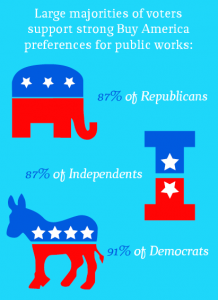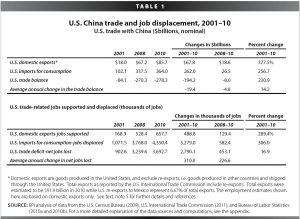Politicians Did Not Get Rich From Hollowing Out the Economy
In his inauguration speech Trump said:
For too long, a small group in our nation’s capital has reaped the rewards of government while the people have born the cost. Washington flourished, but the people did not share in its wealth. Politicians prospered, but the jobs left and the factories closed. The establishment protected itself, but not the citizens of our country. Their victories have not been your victories. Their triumphs have not been your triumphs and, while they celebrated in our nation’s capital, there was little to celebrate for struggling families all across our land.
He claims that politicians got rich by off-shoring jobs and driving up trade deficits. This is an instance of a standard Republican lie, that our problems are caused by politicians. In fact, all the profits from off-shoring went to corporate executives and owners of corporations. They made political contributions, sure, but that doesn’t enrich anyone. The gains to citizens were some lower prices at a cost of whatever wars and worse-paying jobs.
The decisions to off-shore and outsource jobs are made by corporate executives and controlling owners. They had many reasons to invest in other countries, ranging from a desire to protect their own businesses from being underpriced by foreign entitiesk, incentives offered by foreign countries, lower labor costs, and access to foreign markets among others.
US policy in both parties since at least WWII has been generally sympathetic to foreign investment for many reasons, not least the belief that nations linked by commerce and trade are less likely to go to war.
Foreign investment is always dangerous. The risks include expropriation, local governments that won’t or can’t stop violence against plants and equipment, lack of protection of intellectual property, and others. Karl Polanyi discusses these risks in The Great Transformation. Hannah Arendt agrees in The Origins of Totalitarianism. In different words, and with different emphasis, they say Western European capitalists solved this problem by enlisting the government to protect them when they invested abroad. The same thing happened here. Thorstein Veblen saw it clearly in 1904:
… [W]ith the sanction of the great body of the people, even including those who have no pecuniary interests to serve in the matter, constitutional government has, in the main, become a department of the business organization and is guided by the advice of the business men. Chapter 8, Principles of Business Enterprises.
Here’s a discussion of the implications of that statement for foreign investment.
Right down to today, capital enlists the support of the government to protect it so it can make profits in other countries, and government responds for its own reasons. We have always used military force for that purpose, but now the primary tool is trade treaties. The recent example of the TPP stands out. It was written by corporations and their lobbyists and lawyers, and supported by mainstream economists. It was opposed by working people and unions and most progressives. It was supported by a bipartisan majority of legislators. It should be noted that it was rejected by Trump and Sanders and disparaged by Clinton.
I won’t try to untangle all the interlocking interests, or to discuss the negotiations between the two camps, government and capital. But Trump’s assertion that Washington politicians got rich off foreign investment is stupid and false. The people who got all the money from from foreign investment are the executives and the obscenely rich people who own and control these corporations.
The incoherence of Trump’s statements in his inauguration speech and in his campaign speeches about corporate overseas investment is displayed in this New York Times article discussing Trump’s meeting with CEOs of giant US manufacturers. The reporters, Nelson Schwartz and Alan Rappeport, say that Trump told the “titans of American business” that they had better move manufacturing jobs here, threatened them with taxes that look like tariffs, and offered rewards like lower taxes and fewer environmental regulations. The reporters say that this is pointless, because taxes and regulations do not determine where corporate investment are made.
The reporters say that the real cause of overseas investment is Wall Street, by which they mean Capitalists, including hedge fund managers, giant Banks, and the richest investors.
In some cases, Gordon Gekko-like hedge fund managers are to blame, but much of the time, it is the drive for bigger returns on 401(k) accounts, pension plans and other retirement vehicles that depend on steadily rising corporate profits and, in turn, a buoyant stock market.
That’s just wrong. Many pension funds are operated by private Wall Street firms through Gordon Gekko-like managers. The largest funds spread management around among several management firms, and invest with hedge funds, and get investment advice from Wall Street firms for the funds they manage themselves. The idea that Wall Street cares about small investors or their IRAs is silly. I’ll just ignore the stupidity of using a movie character when it’s easy to identify the real perpetrators. You could just read this article to find one, Daniel Loeb.
The actual problem is that the federal government let the interests of the rich set our industrial policy with no public input, and actively ignored the interests of US workers and citizens, and sometimes even the security interests of the nation.
I suppose it’s possible that Trump meant that the rich have too much influence in government, and he means to change that. But seriously, can anyone imagine that the Republicans or the neoliberal Democrats will allow Trump to initiate trade wars over protectionist tariffs? Does anyone think that Trump will do anything to harm the interests of the rich, or that Trump doesn’t personally identify with the rich and their interests?
And exactly how is this different from that time President Obama chewed out the banksters over their greed in April, 2009? Nothing changed then. Why should this time be different?
It won’t be different until a solid majority of voters come to grips with the fact that the dangerous elites in this country aren’t college professors or scientists or liberals. The dangerous elites are the rich people who control the giant corporations and the people who support them, in and out of government.



